Posted by: site admin @ 7:00 pm
𝓛𝓔𝓢𝓢𝓞𝓝 4150 sat 13 Nov 2021
Aboriginal Awakened Societies Thunder ” Hum Prapanch Prabuddha
Prapanchmay karunge.” (We will make the whole world Prabuddha Prapanch
Grams at $62.00 which plays a role in generating energy in the human
body available ‘for the price of a coffee a day’ a Stunning anti-ageing
breakthrough could see humans live to 150 years and regenerate organ.New process has been found by Harvard Professor David Sinclair and researchers from the University of New
South Wales, involving cell reprogramming.
to the University of Singapore survey/review based on 131 countries.
From June 18, world will be 100% free and happy from December 8th. Their
predictions about Italy and Spain fit exactly.
Maker of COVID Tests Says Pandemic is Biggest Hoax Ever Perpetrated
It is like a blind man searching for a black cat in a dark room which
is not there.

WORLD WILL BE FREE FROM HOAX - STRENGTHENING THE TRUST FOR BEST OF HEALTH -SINGAPORE UNIVERSITY SURVEY
 Online Positive Universal Prabuddha Intellectuals Convention.
Online Positive Universal Prabuddha Intellectuals Convention.
After Bath Practice Patanjali Yogic Meditation From 04:00 AM to 05:00 AM at
𝙆𝙪𝙨𝙝𝙞𝙣𝙖𝙧𝙖 𝙉𝙄𝘽𝘽Ā𝙉𝘼 𝘽𝙃𝙐𝙈𝙄 𝙋𝙖𝙜𝙤𝙙𝙖
18𝙛𝙩 𝘿𝙞𝙖. 𝙖 3𝘿 360 𝙙𝙚𝙜𝙧𝙚𝙚 𝙘𝙞𝙧𝙘𝙪𝙡𝙖𝙧 𝙋𝙖𝙜𝙤𝙙𝙖 𝙖𝙩
𝙒𝙝𝙞𝙩𝙚 𝙃𝙤𝙢𝙚,
668 5𝙩𝙝 𝘼 𝙈𝙖𝙞𝙣 𝙍𝙤𝙖𝙙,
8𝙩𝙝 𝘾𝙧𝙤𝙨𝙨, 𝙃𝘼𝙇 𝙄𝙄𝙄 𝙎𝙩𝙖𝙜𝙚,
𝙋𝙪𝙣𝙞𝙮𝙖 𝘽𝙃𝙐𝙈𝙄 𝘽𝙚𝙣𝙜𝙖𝙡𝙪𝙧𝙪,
𝙈𝙖𝙜𝙖𝙙𝙝𝙞 𝙆𝙖𝙧𝙣𝙖𝙩𝙖𝙠𝙖,
𝙋𝙧𝙖𝙗𝙪𝙙𝙙𝙝𝙖 𝘽𝙝𝙖𝙧𝙖𝙩 𝙄𝙣𝙩𝙚𝙧𝙣𝙖𝙩𝙞𝙤𝙣𝙖𝙡

𝙗𝙪𝙙𝙙𝙝𝙖𝙨𝙖𝙞𝙙2𝙪𝙨@𝙜𝙢𝙖𝙞𝙡.𝙘𝙤𝙢
𝙟𝙘𝙨4𝙚𝙫𝙚𝙧@𝙤𝙪𝙩𝙡𝙤𝙤𝙠.𝙘𝙤𝙢
𝙟𝙘𝙝𝙖𝙣𝙙𝙧𝙖𝙨𝙚𝙠𝙝𝙖𝙧𝙖𝙣@𝙮𝙖𝙝𝙤𝙤.𝙘𝙤𝙢
080-25203792
9449260443
9449835875
Spread the Words of Buddha from
𝙝𝙩𝙩𝙥://𝙨𝙖𝙧𝙫𝙖𝙟𝙖𝙣.𝙖𝙢𝙗𝙚𝙙𝙠𝙖𝙧.𝙤𝙧𝙜, WhatApp, Telegram,Facebook, Twitter, more than 5000 Emails.
Practicing Mindful Swimming at Dolphin Aquatics at Halasuru from 05:30 AM to 07:00 AM
stated that “there are four ways of practice. What four? Painful
practice with slow realisation, painful practice with quick realisation,
pleasant practice with slow realisation, and pleasant practice with
quick realisation” in the Saṁkhitta Sutta (AN 4.161)
will examine what these Profitable Directions are, the importance of
learning about these four modes of practice, how we develop these
insight pathways that lead to the four immeasurable states (i.e.
Buddha’s medicine for overcoming the craving for the four nutriments),
how the 37 enlightenment factors are activated and support the Path, and
an overview of how we meditate or contemplate towards unlocking the
doorways to Nibbāna.
get an overview of the framework and process map of the Four Modes of
Practice and how it leads to the Four Immeasurable States
electronic copy of the chart or process map of the “Four Profitable
Directions” has been posted (and pinned) to the Sutta Meditation Series
Telegram channel.
It can also be accessed on multiple podcast platforms including
Spotify, Podcast Addict, Google Podcasts, Apple Podcasts, Amazon Music,
and more.
conditions (doubled as four with synonyms) for the destruction of
suffering: full understanding and abandoning. One should remain aware
not to focus on only one of these two.
-
05) Classical Pāḷi,
kho, bhikkhave, abhijānaṃ parijānaṃ virājayaṃ pajahaṃ bhabbo
dukkha·kkhayāya; vedanaṃ abhijānaṃ parijānaṃ virājayaṃ pajahaṃ bhabbo
dukkha·kkhayāya; saññaṃ abhijānaṃ parijānaṃ virājayaṃ pajahaṃ bhabbo
dukkha·kkhayāya; saṅkhāre abhijānaṃ parijānaṃ virājayaṃ pajahaṃ bhabbo
dukkha·kkhayāya; viññāṇaṃ abhijānaṃ parijānaṃ virājayaṃ pajahaṃ bhabbo
dukkha·kkhayāyā ti.
directly knowing and fully understanding Form, bhikkhus, by getting
dispassionate towards it and abandoning it, one is able to destroy
suffering; by directly knowing and fully understanding Feeling,
bhikkhus, by getting dispassionate towards it and abandoning it, one is
able to destroy suffering; by directly knowing and fully understanding
Perception, bhikkhus, by getting dispassionate towards it and abandoning
it, one is able to destroy suffering; by directly knowing and fully
understanding Constructions, bhikkhus, by getting dispassionate towards
them and abandoning them, one is able to destroy suffering; by directly
knowing and fully understanding Consciousness, bhikkhus, by getting
dispassionate towards it and abandoning it, one is able to destroy
suffering.
 |
Verse 4. Overcoming Anger
Explanation: But in those who forgive and forget the wrongs |
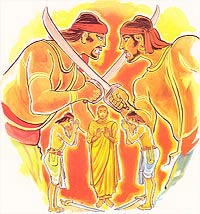 |
Verse 5. Hatred is Overcome Only by Non-hatred
Explanation: The method |
 |
Verse 6. Recollection of Death Brings Peace
Explanation:Excited by emotions our thoughts |
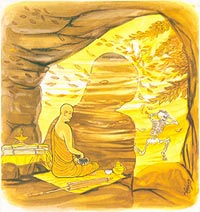 |
Verse 8. Spiritual Strength is Undefeatable
Explanation: Those who are moderate |
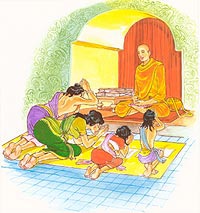 |
Verse 10. The Virtuous Deserve the Stained Robe
Explanation: Who is well conducted and tranquil within, having |
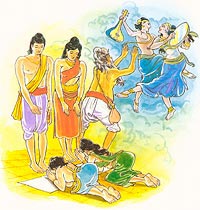 |
Verse 12. Truth Enlightens
Explanation: The wise person who is able |
 |
Verse 14. The Disciplined Mind Keeps Lust Away
Explanation:The well-cultured temperament too does |
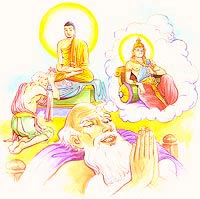 |
Verse 16. Good Deeds Bring Happiness
Explanation: A wise person does good deeds. |
-

Verse 18. Virtuous Deeds Make One Rejoice
Here one’s glad, one’s glad hereafter,
in both ways is the merit-maker glad;
‘Merit I’ve made’, serenely one is glad,
and more one’s glad passed to blissful states.
Explanation: The person who has done good and virtuous deeds
rejoices in this world. Gone to a pleasant state of existence after
death, he rejoices exceedingly. This way he rejoices here and in the
next world. In both worlds he rejoices realizing that he has done
virtuous deeds.
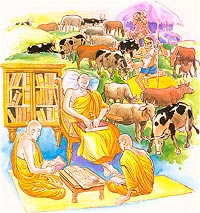 |
Verse 19. Fruits of Religious Life Through Practice
Explanation: Some persons may know the words |
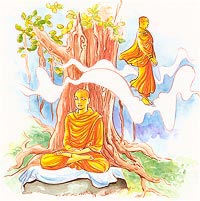 |
Verse 20. Practice Ensures Fulfilment
Explanation: A true seeker of truth through he may speak only |
-
How many languages are there in the world?
-
-
7,117 languages are spoken today.
That number is
constantly in flux, because we’re learning more about the world’s
languages every day. And beyond that, the languages themselves are in
flux. They’re living and dynamic, spoken by communities whose lives are
shaped by our rapidly changing world. This is a fragile time: Roughly 0%
of languages are now endangered, often with less than 1,000 speakers
remaining. Meanwhile, just 23 languages account for more than half the
world’s population.
When
a just born baby is kept isolated without anyone communicating with the
baby, after a few days it will speak and human natural (Prakrit)
language known as Classical Magahi Magadhi/Classical Chandaso
language/Magadhi Prakrit,Classical Hela Basa (Hela Language),Classical
Pāḷi which are the same. Buddha spoke in Magadhi. All the 7,139
languages and dialects are off shoot of Classical Magahi Magadhi. Hence
all of them are Classical in nature (Prakrit) of Human Beings, just like
all other living speices have their own natural languages for
communication. 117 languages are translated by https://translate.google.comin -
-
01) Classical Magahi Magadhi,
-
02) Classical Chandaso language,
-
03)Magadhi Prakrit,04)
Classical Hela Basa (Hela Language),
-
05) Classical Pāḷi,
-
06) ClassicalDevanagari,Classical Hindi-Devanagari- शास्त्रीय हिंदी,
-
07) ClassicalCyrillic08) Classical Afrikaans– Klassieke Afrikaans09) Classical Albanian-Shqiptare klasike,10) Classical Amharic-አንጋፋዊ አማርኛ,11) Classical Arabic-اللغة العربية الفصحى12) Classical Armenian-դասական հայերեն,13) Classical Assamese-ধ্ৰুপদী অসমীয়া
14) Classical Azerbaijani- Klassik Azərbaycan,
-
-
20) Classical Catalan-Català clàssic
-
21) Classical Cebuano-Klase sa Sugbo,
-
22) Classical Chichewa-Chikale cha Chichewa,23) Classical Chinese (Simplified)-古典中文(简体),24) Classical Chinese (Traditional)-古典中文(繁體),25) Classical Corsican-Corsa Corsicana,26) Classical Croatian-Klasična hrvatska,
-
27) Classical Czech-Klasická čeština28) Classical Danish-Klassisk dansk,Klassisk dansk,29) Classical Dutch- Klassiek Nederlands,30) Classical English,Roman,31) Classical Esperanto-Klasika Esperanto,32) Classical Estonian- klassikaline eesti keel,
-
33) Classical Filipino klassikaline filipiinlane,
34) Classical Finnish- Klassinen suomalainen,35) Classical French- Français classique,36) Classical Frisian- Klassike Frysk,37) Classical Galician-Clásico galego,38) Classical Georgian-კლასიკური ქართული,39) Classical German- Klassisches Deutsch,40) Classical Greek-Κλασσικά Ελληνικά,41) Classical Gujarati-ક્લાસિકલ ગુજરાતી,42) Classical Haitian Creole-Klasik kreyòl,43) Classical Hausa-Hausa Hausa,44) Classical Hawaiian-Hawaiian Hawaiian,45) Classical Hebrew- עברית קלאסית46) Classical Hmong- Lus Hmoob,47) Classical Hungarian-Klasszikus magyar,48) Classical Icelandic-Klassísk íslensku,49) Classical Igbo,Klassískt Igbo,50) Classical Indonesian-Bahasa Indonesia Klasik,51) Classical Irish-Indinéisis Clasaiceach,52) Classical Italian-Italiano classico,53) Classical Japanese-古典的なイタリア語,54) Classical Javanese-Klasik Jawa,55) Classical Kannada- ಶಾಸ್ತ್ರೀಯ ಕನ್ನಡ,56) Classical Kazakh-Классикалық қазақ,57) Classical Khmer- ខ្មែរបុរាណ,58) Classical Kinyarwanda59) Classical Korean-고전 한국어,60) Classical Kurdish (Kurmanji)-Kurdî (Kurmancî),61) Classical Kyrgyz-Классикалык Кыргыз,62) Classical Lao-ຄລາສສິກລາວ,63) Classical Latin-LXII) Classical Latin,64) Classical Latvian-Klasiskā latviešu valoda,65) Classical Lithuanian-Klasikinė lietuvių kalba,66) Classical Luxembourgish-Klassesch Lëtzebuergesch,67) Classical Macedonian-Класичен македонски,68) Classical Malagasy,класичен малгашки,69) Classical Malay-Melayu Klasik,70) Classical Malayalam-ക്ലാസിക്കൽ മലയാളം,71) Classical Maltese-Klassiku Malti,72) Classical Maori-Maori Maori,73) Classical Marathi-क्लासिकल माओरी,74) Classical Mongolian-Сонгодог Монгол,75) Classical Myanmar (Burmese)-Classical မြန်မာ (ဗမာ),76) Classical Nepali-शास्त्रीय म्यांमार (बर्मा),77) Classical Norwegian-Klassisk norsk,
-
78) Classical Odia (Oriya)79) Classical Pashto- ټولګی پښتو80) Classical Persian-کلاسیک فارسی81) Classical Polish-Język klasyczny polski,82) Classical Portuguese-Português Clássico,83) Classical Punjabi-ਕਲਾਸੀਕਲ ਪੰਜਾਬੀ,84) Classical Romanian-Clasic românesc,85) Classical Russian-Классический русский,86) Classical Samoan-Samoan Samoa,
-
87) Classical Sanskrit छ्लस्सिचल् षन्स्क्रित्88) Classical Scots Gaelic-Gàidhlig Albannach Clasaigeach,
-
89) Classical Serbian-Класични српски,90) Classical Sesotho-Seserbia ea boholo-holo,91) Classical Shona-Shona Shona,92) Classical Sindhi,93) Classical Sinhala-සම්භාව්ය සිංහල,94) Classical Slovak-Klasický slovenský,95) Classical Slovenian-Klasična slovenska,96) Classical Somali-Soomaali qowmiyadeed,97) Classical Spanish-Español clásico,98) Classical Sundanese-Sunda Klasik,99) Classical Swahili,Kiswahili cha Classical,100) Classical Swedish-Klassisk svensk,101) Classical Tajik-тоҷикӣ классикӣ,
102) Classical Tamil-பாரம்பரிய இசைத்தமிழ் செம்மொழி,103) Classical Tatar104) Classical Telugu- క్లాసికల్ తెలుగు,105) Classical Thai-ภาษาไทยคลาสสิก,106) Classical Turkish-Klasik Türk,107) Classical Turkmen108) Classical Ukrainian-Класичний український,109) Classical Urdu- کلاسیکی اردو110) Classical Uyghur,111) Classical Uzbek-Klassik o’z,112) Classical Vietnamese-Tiếng Việ,113) Classical Welsh-Cymraeg Clasurol,114) Classical Xhosa-IsiXhosa zesiXhosa,115) Classical Yiddish- קלאסישע ייִדיש116) Classical Yoruba-Yoruba Yoruba,117) Classical Zulu-I-Classical Zulu
